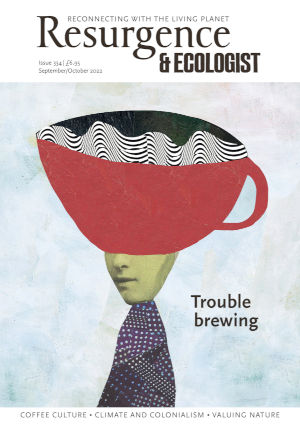A large emerald with intricate scalloped edges – the kind of green that feels wholesome and luxurious at the same time. This is not a gemstone extracted from layers of rock in open pit mining or blasted to the surface through the use of high-pressure water. This treasure is alive. It’s a moth.
This particular moth is among a trove of insects identified at Hilltown Organics when they invited families onto the site to learn the names of flowering plants beneficial to wildlife. As well as growing a rich variety of vegetables, this small farm in Devon has lots of room for wildlife, with nettles, woodland and thriving hedgerows. “What’s the point of thistles, brambles and nettles? They are food plants for many thousands of creatures, from pollinator insects, moths and butterflies to beetles and birds,” farmer Martin Godfrey said. “When we understand the food plants of these amazing creatures of the night, the moths, of which there are 1,500 different species in the UK, we might have a different respect for what we consider as annoying weeds.”
“Different respect” requires a change in mindset – from the idea of material, individual wealth to an appreciation of the riches of fecund Nature. “Nature’s value beyond that for which we can attach a price – whether spiritual, cultural or otherwise – is ignored at our collective peril,” writes Adrienne Buller in our Ecologist section. The urgency of this switch is becoming starker every hour. I’m writing this not long after the hottest day recorded in the UK. Our way of life, propelled by an addiction to fossil fuels, is buckling in the heat.
In this issue of Resurgence & Ecologist, we visit an area of all our lives at the forefront of this need for change – farming. In Connected Life, Roman Goergen takes us to a rewilding project in Portugal, where we see the effects of EU agricultural subsidies on the land. Nicola Cutcher scrutinises the ethics of the dairy industry, and Edward Davey speaks to author Anna Jones about the cultural divide between urban and rural England. For our themed section, we explore the human relationship with a plant that has become one of the world’s most profitable international commodities – coffee. And in our reviews, we feature two takes on George Monbiot’s latest blockbuster, Regenesis: Feeding the World without Devouring the Planet.
Real treasure is not a thing to be sought through destruction, a cold, unliving object forged in rock under our feet. It is not something on which we can stick a price tag or covet in a vault. It is ethereal and transient, like the wings of a moth, and at the same time part of a cycle of life in which we are all intricately woven.







